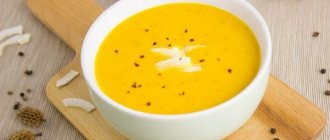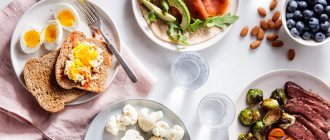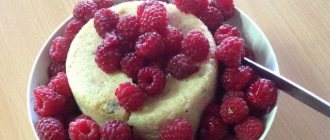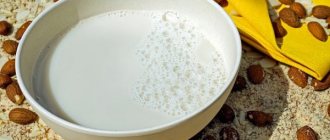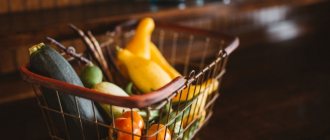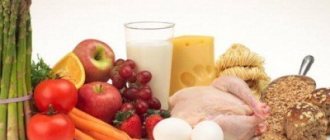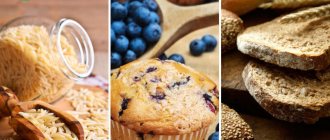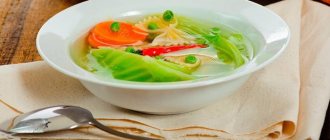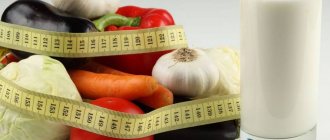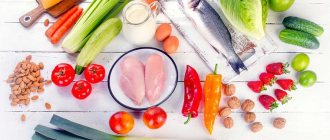General rules
Summer is the best time to switch to proper and healthy nutrition.
One of the brightest, most effective and juicy is the rainbow diet. The basic principle of nutrition is to eat as many colored fruits, vegetables and berries as possible. That is why the rainbow diet is known by several other names: “colored” or simply “rainbow”. Products of plant origin get their color and color for a reason. Special phytochemicals give a certain color, smell, taste and texture. Each substance has a specific set of nutrients and cannot be replaced by another. For example, blueberries cannot replace raspberries, and peas cannot replace carrots, etc.
Eating on the rainbow diet consists of choosing your daily diet according to the color of the food (orange, blue, purple, white, red, yellow, green in the diet).
Red
Red vegetables, berries and fruits contain large amounts of lycopene and anthocyanin . Lycopene acts as an antioxidant , and anthocyanin is a plant pigment. Red foods are rich in fiber, manganese, vitamin A and ascorbic acid . It has been proven that flavonoids have not only an antioxidant effect, but also an antitumor effect. Red fruits and vegetables remove breakdown products of free radicals from the body, stabilize blood pressure cholesterol levels . For example, rhubarb contains a large amount of calcium and vitamin K , pomegranates contain B vitamins folic acid .
Yellow and orange
Sun products are rich in beta-carotene , which is a form of vitamin A. Additionally, fruits and vegetables of this color can enrich the body with vitamins A and C, which are so necessary for maintaining healthy skin and for the full functioning of the immune system . Bananas are rich in magnesium, iron, calcium, phosphorus and potassium, while corn is rich in starch and Mg.
White
The white color in plant products appears due to the pigment anthoxanthin . White vegetables and fruits have antiviral, antifungal and antimicrobial effects. Additionally, the body is enriched with folic acid, vitamins K and C, and fiber. Soybeans are rich in magnesium, iron, sodium and potassium, and onions and garlic are simply irreplaceable in the fight against colds.
Green
Green fruits and vegetables owe their color to chlorophyll , which is able to repair damaged cells. The “green” arsenal is rich in potassium, calcium, fiber, B vitamins and minerals. Regular consumption of products from this category can improve vision, the condition of the skeletal system and teeth, and normalize the functioning of the immune system. Green foods have been proven to help maintain a healthy heart, fight diabetes and lower cholesterol .
Blue and purple
Plant products from this color range are rich in antioxidants, anthocyanins and flavonoids (resveratrol, lutein, ellatic acid, zeaxanthin). Additionally, the “blue-violet” group is rich in fiber, manganese, vitamins K and C.
Menu for every day of the week with recipes
Monday in white
The diet can include milk and all its derivatives, rice, white cabbage, onions, garlic, durum spaghetti, chicken, and white fish. Potatoes should be consumed with caution.
White color gives off energy. This time is ideal for cleansing the lungs and intestines, as well as combating stress and signs of depression.
Potato salad
Boil the potatoes in their skins, cool, peel and cut into cubes. Add crushed garlic and a little onion to it. Season with vegetable oil or kefir. Lightly salt it.
Boiled fish
Gut any white fish and remove the fins. Boil in slightly salted water.
Chicken soup
Remove skin and fat layer from chicken breast. Cut into small pieces, place in cold water and bring to a boil. Remove foam from the surface. Boil the chicken for about 20 minutes, then add chopped onions, washed rice or some potatoes. Add a pinch of table salt and cook until done.
A recipe for boiled chicken breast is also suitable for a colored diet; the recipes have already been calculated.
Tuesday in Red
The diet for this day should consist of tomatoes, bell peppers, beets, beans, lean meat and other red foods. It is generally accepted that the color red helps to increase muscle tone and improve blood circulation. Vegetables and fruits, colored in a rich red color, are rich in antioxidants, which rejuvenate the body, improve immunity and help cope with stress.
Korean beet salad
Peel the raw beets, grate them using a coarse grater, add a little vinegar, salt and ground red pepper. Mix.
Meat with pomegranate sauce
Marinate a piece of lean meat in pomegranate juice with the addition of a small amount of salt. After a few hours, add red onion, cut into half rings, to the meat. Stew in a frying pan or bake in the oven.
Tomato and bell pepper salad
Cut ripe tomatoes into slices or cubes. Remove seeds from pepper and chop into thin strips. Add a pinch of salt. If the salad in this form seems a little dry, then you can season it with a few drops of vegetable oil.
Wednesday in green
On this day it is necessary to create a menu of green products. For example, cucumbers, zucchini, green peas, lettuce. You can drink various herbal infusions and teas. Green color helps normalize hormonal balance in the body and cleanse. It also helps you relax and find peace.
Green soup
To prepare this soup you need to take cabbage, sorrel, and green peas. Wash them and chop them. Boil water, add salt, add vegetables and boil until tender. You can add absolutely any greens to the soup to suit your taste.
Cabbage and cucumber salad
The cabbage must be finely chopped and mashed with your hands until juice forms. Cucumbers should be washed and cut into thin circles or slices. The salad must be supplemented with a small amount of salt and table vinegar.
Stewed zucchini
Wash the zucchini, cut into cubes or into circles, add a small amount of clean water and simmer until tender. You can add a little salt during cooking.
Thursday in orange
On an “orange” day, you can only eat foods of this color. Oranges, tangerines, persimmons, carrots, mangoes, apricots, pumpkins and other vegetables and fruits of similar colors are suitable. They help cope with colds and give optimism. In general, this color promotes the development of creativity and creativity.
Korean carrots
Authorized Products
Products vary depending on the diet day.
On the first day, you can only eat red foods of both plant and animal origin (raspberries, peppers, strawberries, etc.). On this day, steamed beef, red fish and even dry red wine are allowed.
On the second day, you are allowed to eat all orange-colored foods. Fruits are mainly citrus fruits (grapefruits, oranges and tangerines). Vegetables: carrots, orange peppers. It will be useful to eat a salmon fillet dish on this day.
On the third day you can eat everything yellow. Fruits include yellow apples, plums, and peppers. You can eat potatoes, zucchini and pineapples.
On the fourth day, you can eat everything green: cucumbers, asparagus, seaweed, peppers, spinach, etc.
On the fifth day, the menu will be more dense: white fish, cheese, pasta, egg whites. On this day it is important not to overeat, because... the diet is quite high in calories compared to previous days and the risk of failure is high.
The sixth day is the hungriest day, the “blue” day. During the day you should drink only mineral water. You can eat 1 bunch of blue grapes or a glass of ripe blueberries.
On the seventh day you can eat eggplants, red cabbage, and grapes.
Drinks include water and freshly squeezed juices.
Table of permitted products
| Proteins, g | Fats, g | Carbohydrates, g | Calories, kcal | |
Vegetables and greens | ||||
| vegetables | 2,5 | 0,3 | 7,0 | 35 |
Fruits | ||||
| fruits | 0,8 | 0,3 | 11,5 | 56 |
Berries | ||||
| berries | 0,7 | 0,3 | 9,4 | 44 |
Mushrooms | ||||
| mushrooms | 3,5 | 2,0 | 2,5 | 30 |
Nuts and dried fruits | ||||
| nuts | 15,0 | 40,0 | 20,0 | 500 |
| candied fruit | 2,0 | 1,0 | 71,0 | 301 |
| dried fruits | 2,3 | 0,6 | 68,2 | 286 |
Cereals and porridges | ||||
| porridge | 3,3 | 1,2 | 22,1 | 102 |
Raw materials and seasonings | ||||
| honey | 0,8 | 0,0 | 81,5 | 329 |
Dairy | ||||
| milk | 3,2 | 3,6 | 4,8 | 64 |
| sour cream | 2,8 | 20,0 | 3,2 | 206 |
| Ryazhenka | 2,8 | 4,0 | 4,2 | 67 |
Cheeses and cottage cheese | ||||
| cheese | 24,1 | 29,5 | 0,3 | 363 |
Meat products | ||||
| beef | 18,9 | 19,4 | 0,0 | 187 |
Bird | ||||
| chicken | 16,0 | 14,0 | 0,0 | 190 |
Eggs | ||||
| chicken eggs | 12,7 | 10,9 | 0,7 | 157 |
Fish and seafood | ||||
| fish | 18,5 | 4,9 | 0,0 | 136 |
Alcoholic drinks | ||||
| dry red wine | 0,2 | 0,0 | 0,3 | 68 |
Non-alcoholic drinks | ||||
| water | 0,0 | 0,0 | 0,0 | — |
| mineral water | 0,0 | 0,0 | 0,0 | — |
| green tea | 0,0 | 0,0 | 0,0 | — |
| black tea | 20,0 | 5,1 | 6,9 | 152 |
Juices and compotes | ||||
| compote | 0,5 | 0,0 | 19,5 | 81 |
| juice | 0,3 | 0,1 | 9,2 | 40 |
| * data is per 100 g of product | ||||
Fully or partially limited products
Fast food and all high-calorie dishes (fatty, fried, etc.) are absolutely prohibited. On the “red day”, the consumption of dry red wine is allowed (no more than 1 glass). The use of spices and salt when preparing dishes is prohibited. Sugar is prohibited. The last meal should be 4 hours before going to bed.
Table of prohibited products
| Proteins, g | Fats, g | Carbohydrates, g | Calories, kcal | |
Snacks | ||||
| potato chips | 5,5 | 30,0 | 53,0 | 520 |
| banana chips | 2,3 | 33,6 | 50,7 | 519 |
| caramel popcorn | 5,3 | 8,7 | 76,1 | 401 |
Bakery products | ||||
| bread | 7,5 | 2,1 | 46,4 | 227 |
Confectionery | ||||
| baursak | 6,8 | 2,6 | 45,8 | 234 |
| jam | 0,3 | 0,2 | 63,0 | 263 |
| jam | 0,3 | 0,1 | 56,0 | 238 |
| jelly | 2,7 | 0,0 | 17,9 | 79 |
| marshmallows | 0,8 | 0,0 | 78,5 | 304 |
| candies | 4,3 | 19,8 | 67,5 | 453 |
| confiture | 0,9 | 0,2 | 40,3 | 183 |
| Lukma | 2,0 | 2,1 | 75,6 | 380 |
| cookie | 7,5 | 11,8 | 74,9 | 417 |
| cake | 3,8 | 22,6 | 47,0 | 397 |
| dough | 7,9 | 1,4 | 50,6 | 234 |
| halva | 11,6 | 29,7 | 54,0 | 523 |
| chuck-chuck | 8,6 | 1,9 | 77,9 | 363 |
Ice cream | ||||
| ice cream | 3,7 | 6,9 | 22,1 | 189 |
Cakes | ||||
| cake | 4,4 | 23,4 | 45,2 | 407 |
Chocolate | ||||
| chocolate | 5,4 | 35,3 | 56,5 | 544 |
Raw materials and seasonings | ||||
| seasonings | 7,0 | 1,9 | 26,0 | 149 |
| salt | 0,0 | 0,0 | 0,0 | — |
| barbecue sauce | 0,6 | 0,7 | 39,4 | 166 |
Sausages | ||||
| boiled sausage | 13,7 | 22,8 | 0,0 | 260 |
| * data is per 100 g of product | ||||
Menu (Meal Schedule)
red day
| Breakfast |
|
| Lunch |
|
| Dinner |
|
| Afternoon snack |
|
| Dinner |
|
orange day
| Breakfast |
|
| Lunch |
|
| Dinner |
|
| Afternoon snack |
|
| Dinner |
|
Yellow day
| Breakfast |
|
| Lunch |
|
| Dinner |
|
| Afternoon snack |
|
| Dinner |
|
Green Day
| Breakfast |
|
| Lunch |
|
| Dinner |
|
| Afternoon snack |
|
| Dinner |
|
White Day
| Breakfast |
|
| Lunch |
|
| Dinner |
|
| Afternoon snack |
|
| Dinner |
|
Blue day
- a bunch of blue grapes or a glass of blueberries;
- mineral water.
Purple day
| Breakfast |
|
| Lunch |
|
| Dinner |
|
| Afternoon snack |
|
| Dinner |
|
Advantages and disadvantages
| pros | Minuses |
|
|
Positive and negative aspects of the colored diet
Pros:
- Every day is rich in food and vitamins, grains, and you don’t feel hungry.
- Variety of ingredients so you don't get bored with the same type of food.
- With the help of high-quality balancing of all vegetables and fruits, you can create a complete diet for the whole week.
- The consumption of junk food is limited.
- The consequence of cleansing the body is weight loss of up to 3 kg.
There are pros and cons
Cons:
- In winter, such a diet is quite expensive.
- The presence of one day of fasting can affect a person's health in different ways.
- We need to prepare different dishes every day.
- Minor weight loss.
The colored diet is quite interesting and varied. It will help cleanse your body and saturate it with many useful components. You will also feel a surge of strength and improve your health. Get your body and appearance in order.
Important Terms
- Meals should be frequent - up to 6 times a day.
- You can use nuts, vegetables and fruits as snacks between main meals.
- Try to drink more clean water.
- Don’t forget to be active - in your free time, walk in the fresh air, play team games, run.
- Eliminate all ingredients and spices that can stimulate the appetite.
- Avoid fried foods completely; give preference to steamed, boiled and raw foods.
Meaning, rules and types of color diet
Research by scientists has helped establish that the components that are responsible for the color of plants have a positive effect on human health. Phytonutrients determine the color of foods, as well as their beneficial properties. It follows that each color has its own function and affects the body and well-being in a certain way. So, when a person eats food of plant origin of the same color throughout the day, an accumulation of these substances occurs, which helps to normalize internal processes and also trigger the natural norm of the body.
IMPORTANT: The color diet is a way of eating based on sorting foods by color and changing their consumption by day while losing weight.
The essence of the color diet is that every day you need to eat foods of only one color. And the main goal, in fact, is not to lose weight, but to cleanse the body, as a result of which the extra pounds go away. In a few days you can lose up to 3 kg, depending on the products you eat.
The diet should be carried out in the summer or autumn, since this is the optimal time when almost all fresh vegetables and fruits are available. In winter, this type of food can be very expensive.
Bright
The colored diet is one of the light and non-debilitating nutrition systems. You do not deny yourself products and their quantities. To get the maximum benefit from such nutrition, you must additionally adhere to the following conditions:
- Eliminate any dyes, even if they match the color of the day.
- Prepare dishes by steaming or in the oven, do not eat fried, excessively fatty or unhealthy foods. Limit flour and sweet products.
- Give preference to plant foods, but do not forget about animal proteins (eggs, fresh fish, milk and dairy products).
- Eat small portions 5-6 times a day. It will be easier for the body to cope with digesting food. Make breakfast hearty and complete, and for dinner you should eat less high-calorie food and half as much as in the morning.
- Observe the drinking regime - drink at least 1.5 liters of clean water.
- Seasonings and salt during the diet should be reduced or, better yet, removed from the diet altogether.
- Alcoholic drinks are completely prohibited, otherwise your weight will double in a short time.
- Those who want to lose weight should definitely engage in physical activity. This can be not only the gym, but also brisk walking during a walk or exercise in the morning.
Color scheme
strict rules for the color diet , except for the color scheme and the above mentioned points. It is designed for 7 days, but it can be extended to two weeks, but be sure to alternate with a week of normal nutrition. To lose more than 1-2 kg, it is necessary to exclude high-calorie foods (bananas, grapes, potatoes, etc.).
Be sure to consult your doctor before starting a color diet. Because one day of fasting is included, which can have a bad effect on people who have ulcers, problems with the intestines, kidneys, liver, etc.
In pursuit of a slim figure, do not forget about your health, do not try to damage it. Always choose your products wisely and your entire life will be stable and comfortable for you.
Diet
Types of colored diet:
- Traditional color diet - it is allowed to swap colors in any order according to the days of the week.
- Rainbow diet - strict adherence to the colors of the rainbow every day. The menu is provided for 7 days and each color is coordinated with the expression: “Every (red) hunter (orange) wants (yellow) to know (green) where the (blue) pheasant (pheasant) sits.” This diet is considered more gentle because it does not include a day of fasting.
Advice and comments from nutritionists
Many nutritionists recommend introducing white foods into your diet, regardless of whether you are on a diet or not. These include: mushrooms, garlic, cabbage, white radishes, onions, radishes, etc. “White” foods are rich in phytochemical compounds that can not only lower blood pressure , but also remove “bad” cholesterol from the body. Most reputable weight loss experts support this diet. It is recommended to eat 5 servings of vegetables or fruits daily to improve your figure and replenish it with vitamins and minerals.
Completing the Color Diet
Finishing the diet will not be difficult. You can continue to use the same food products in your diet, but in mixed colors. Be sure to look at the calorie content of foods, do not increase it sharply if it has been significantly reduced. The duration of getting used to the usual regime should be the same as the period of the color menu. If you finished with a water day, then after it it is better to have a day filled with protein foods. Then your body will quickly return to its normal mode.
Reviews of the colored diet and its results
Reviews from those who have lost weight are mostly positive: the diet really works, but the preservation of the achieved result depends entirely on the correct exit from the diet. Among the minuses, one can note the present feeling of hunger, bowel irregularities, increased gas formation due to the abundant presence of fruits and vegetables.
During the diet, the condition of the facial skin improves, because... Plant-based products are rich in fiber, which, like a brush, cleanses the intestines, ridding the body of stagnant toxins and waste.
Contraindications
The rainbow diet is not suitable for those who have been diagnosed with gastrointestinal diseases, kidney problems, or allergic reactions to various foods used during weight loss. Although the last contraindication is not categorical, because the set of products can be adjusted to suit your own preferences and capabilities. The main thing is that all components of the diet are the required color.
Is it possible to follow a diet for mastopathy?
The disease often occurs against the background of hormonal imbalance and the appearance of excess weight in a woman. In order to stabilize the condition and fight back the disease, it is necessary to switch to the correct diet, while making plant-based products the basis of the diet. The Rainbow Diet suggests eating large amounts of these foods. Therefore, it is not contraindicated for mastopathy, but you still need to consult a doctor.
